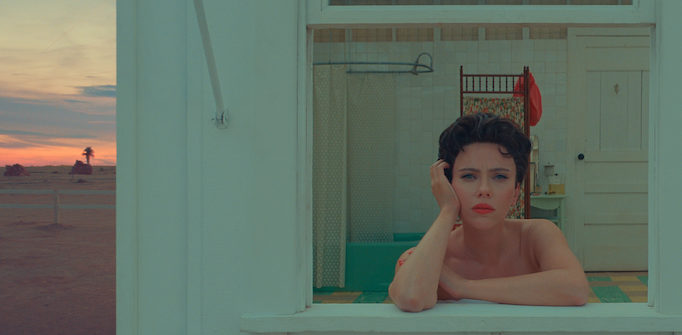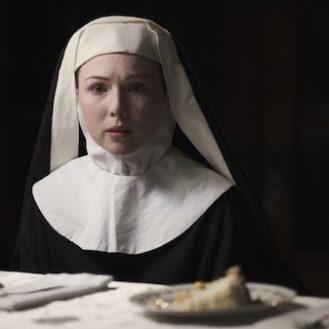By: Jeff Ching
Wes Anderson is one of very few current directors where viewers can watch 10 seconds of a trailer promoting his film, and immediately identify it as “a Wes Anderson movie”. I don’t know whether that’s a good or bad thing, but credit to him for such a distinctive style. He may be the most “auteuristic” auteur ever, if that makes any sense. Does it? I don’t know. Moving on…
Have you ever wondered what an episode of The Twilight Zone would be like with Wes Anderson behind the wheel? Welcome to Asteroid City. If you’re a huge fan of Anderson’s, I don’t see any reason that you won’t enjoy this. On the other hand, if you complain that he keeps making the same movie over and over again, his latest isn’t going to change your mind. I find myself somewhere in the middle. I loved The Royal Tenenbaums and The Grand Budapest Hotel, but I feel rather indifferent towards the rest of his filmography. Asteroid City, more than any of Anderson’s other movies, ended with me asking myself, “What the hell did I just watch?” On the other hand, I was thoroughly entertained from beginning to end. It’s very funny and always engaging, even with its random and meandering plot.
The year is 1955. Everyone gathers in a small fictional dessert town for a stargazing event. However, a very shocking, unexpected event happens that forces everyone to quarantine in Asteroid City until further notice, as the government wants the event to be top secret. And so, we follow the day-to-day lives of everyone stuck in Asteroid City as well as other random happenings, like atomic bombs being tested in the distance.
Jason Schwartzman (who’s been Wes Anderson’s most dependable actor since 1997’s Rushmore) plays Augie Steenbeck, a war photographer who brings his three children to Asteroid City. His wife passed away three weeks before quarantining, yet he still hasn’t found the way to break the news to his kids. The movie generates some great dark comedy out of this scenario. Scarlett Johansson plays Midge Campbell, an actress who’s staying in a cabin right across from Augie’s. They strike up an unlikely friendship during a point in their lives when they’re both desperate for a personal connection. The deadpan conversations between Schwartzman and Johansson between their cabin windows are whimsical, fun and full of chemistry, and the wide shots during these moments are really attractive.
Asteroid City has a lot of secondary characters – perhaps too many. It feels like just about every A-list actor in Hollywood wanted to be in this movie, so Wes Anderson tried to shoehorn them all into the script. As cool as it is to experience this ensemble cast, from household names like Tom Hanks, Edward Norton, Margot Robbie and Steve Carell to indie darlings like Hong Chau and Tilda Swinton, most of these performers have very little material to work with and their characters don’t necessarily add anything substantial to the movie.
Asteroid City also has a meta narrative to it, as the story in Asteroid City is also presented as a TV play. Narrated by Bryan Cranston and shot in black and white, the play takes up a small portion of the movie. However, whenever the narrative cuts to this play but every time we cut to it, I just wanted to return to the main story. This tangent in the screenplay (written by Anderson and Roman Coppola) feels like a choice to add more complexity to the story, but it ends up being detrimental to the movie’s momentum. With more straight-forward storytelling, Asteroid City could’ve further fleshed out its array of characters.
Wes Anderson’s trademark style is in full force in Asteroid City, with beautiful symmetrical shot compositions and stunning long takes with very smooth, dynamic cinematography. The set design is fantastically gorgeous as well, with its unique color palette is quite unique. On a visual level, Asteroid City is at the top of Wes Anderson’s filmography. Another Wes Anderson M.O is his comedy: quirky, dark humour with characters that are eccentric oddballs. The Royal Tenenbaums and The Grand Budapest Hotel aside, Asteroid City is Wes Anderson’s funniest movie; especially when the movie embraces the absurd.
I find myself reflecting on a criticism that has followed the filmmaker throughout his entire career: the emotional distance between the material and the viewer. I have a suspicion that Wes Anderson really hates the emotional manipulation of mainstream Hollywood dramas, and he wants to represent the cynical, opposite end of emotional manipulation. As much as I respect that, his approach with deadpan characters showing no emotion but, at the same time, addressing how internally broken they are makes it hard for the audience to empathize. Considering he’s still struggling to find a balance with this characterization (with the exception being The Royal Tenenbaums [22 years ago!]), I’d like to see him try to tap into a bit – even if it’s the tiniest bit – of emotional manipulation with his next project. Take Noah Baumbach, for example. I find Baumbach comparable to Anderson regarding this emotional wall. After also being guilty of the same criticism, Baumbach challenged himself and made his best film to date, Marriage Story – a movie where the viewer can finally empathize with his characters and even shed tears. The audience needs to see this same growth with Wes Anderson.
Despite this recurring problem with the heart and soul of Anderson’s work, the entertaining strengths outweigh the weaknesses in Asteroid City. It’s a film that makes you smile as you reminisce about it, and makes you eager to watch it again soon.
***1/2 (out of 5)
**********
Read more of Jeff Ching’s thoughts on film at The Ching of Comedy’s blog.





Be the first to comment